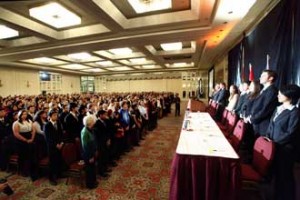
1,400 students visit McGill to simulate running the world
By Pascal Zamprelli
It was a classic diplomatic standoff. The resolution, co-sponsored by Russia and the United Kingdom, recognized “that the rampant piracy off the horn of Africa is due to lawlessness in Somalia and continued toleration of pirate bases,” and would call upon member nations to commit troops and ships to the Gulf of Aden and authorize attacks on pirate bases off the Somali coast.
But what of territorial sovereignty wondered the representative from Japan. “Japan speaks against Russia’s belief that you can simply invade nations to go after terrorist groups. Certainly, if Japan needed to find a terrorist group in Siberia, Russia would have something to say about that.”
“There are no terrorists in the Russian Federation,” huffed their angered representative before the representative from Mexico interjected, cutting to the crux of the debate: “This is the United Nations Security Council,” she implored. “We should be able to take some kind of action.”
So, it wasn’t the real thing. But the McGill Model United Nations Assembly (McMUN), held this past weekend at the Centre Sheraton, at times felt pretty close.
McGill’s model UN is the largest event of its kind in Canada, and one of the largest in the world, hosting nearly 1,400 students and representing some 80 universities from across Canada, the U.S. and abroad. Participants came from as far away as Florida, California and Venezuela, sent by such schools as Harvard, Acadia, the University of Calgary, M.I.T. and the U.S. Military Academy. McMUN has seen outstanding growth since it’s inception in 1991, when 30 delegates participated. Today, there are more than 300 volunteers on the staff alone.
Former Prime Minister and Foreign Affairs Minister Joe Clark, no stranger to the inner workings of the UN, kicked things off with a keynote speech on Thursday night. The former Professor of Practice for Public-Private Sector Partnerships at the McGill Centre for Developing Area Studies touched on the resurgence of diplomacy and development, the world’s shifting power balance, and the ways in which individuals and organizations can effect change.
“I want to recruit you to the cause of reinforcing the world’s capacity for development and diplomacy,” Clark said, “by urging your governments at home to actually shift their conventional approach, and give more relative priority to diplomacy and development, and less to military might and economic instruments. That is a big challenge.”
Clark also dropped in the next morning to see the students at work. Delegates broke off into committees of various sizes, where they put themselves in the shoes of world leaders, past and present, and simulated some of the most historically important international debates and
discussions.
“I like to think that most of our sessions inspired pretty heated debate,” said Anders Whist, a political science student who has been involved with McMUN for three years, serving this year as Secretary-General. Indeed, it would be difficult to recreate a joint meeting of the Israeli and Egyptian cabinets of 1967, a meeting of the 2008 Iraqi cabinet, or a special session on Palestine without a few sparks flying – particularly when everyone stays in character.
Whist sees McMUN as both a learning experience and a social one for participants. “It’s an opportunity to learn a lot about different things that maybe aren’t covered in a traditional class setting,” he said. “Going hand in hand with that, it’s a chance to meet people you would otherwise never get to meet,
and really build friendships that last beyond the weekend; an opportunity to engage with other people with similar interests but perhaps with different backgrounds.”
Whist explained that the event drew “a good mix of people,” some of whom hope to end up at the real UN, in government, or in the public service, others who might be angling toward non-governmental organizations, and others still who are on track to become doctors
and engineers.
All are likely, however, to accept the challenge put to them by Clark on opening night: “I urge you to become more forceful advocates of the organization and the idea, which has brought you here – the United Nations. Each of you can make a difference,” he concluded, “in this challenging, changing international
environment.”
